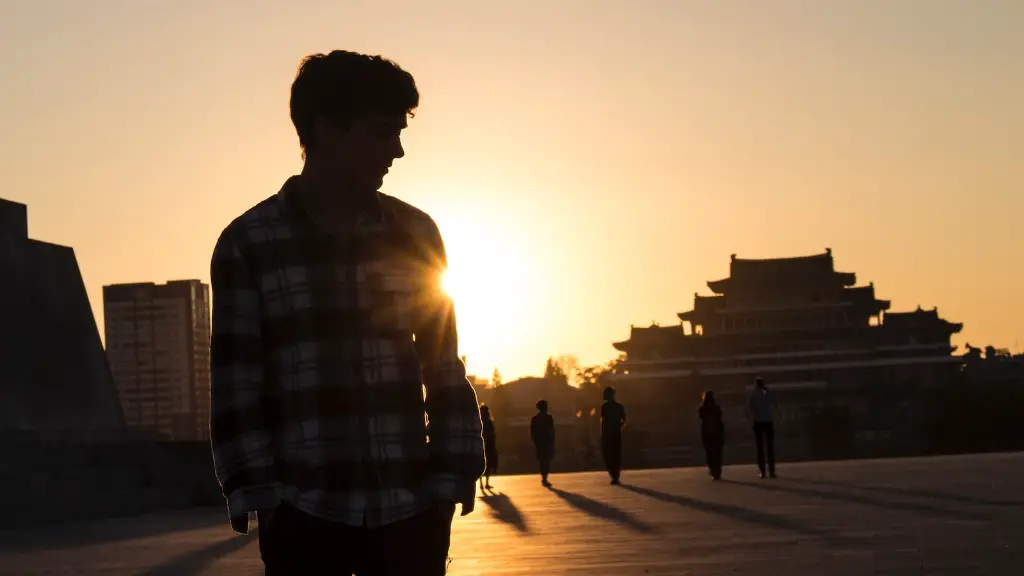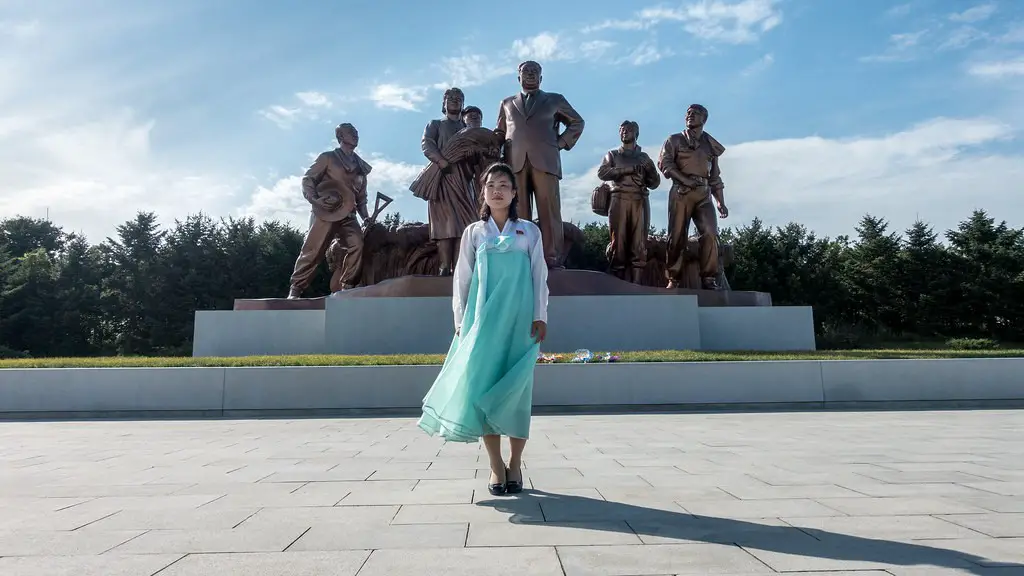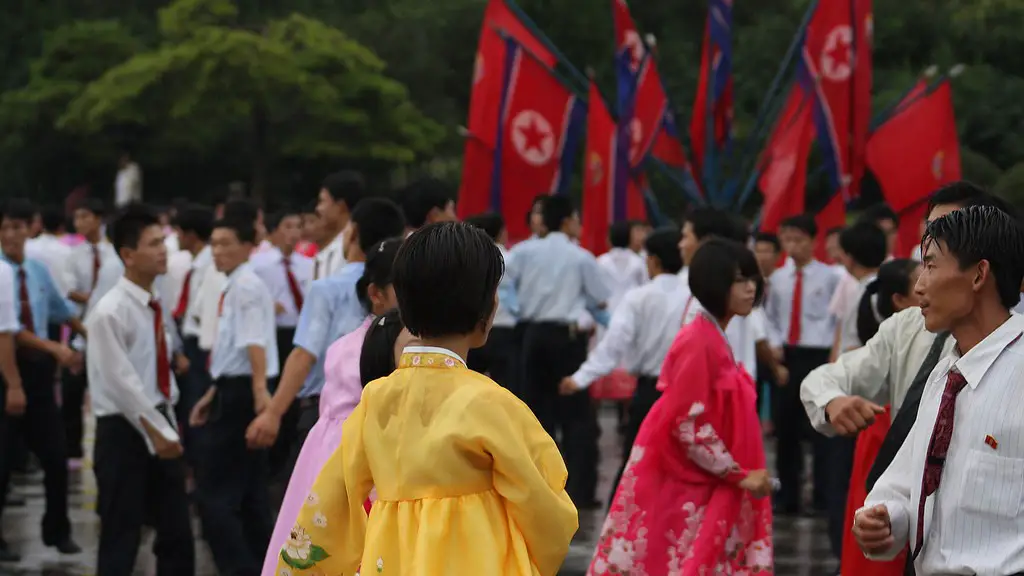Overview of North Korea and Religion
North Korea is a region located in East Asia and is a single-party state governed by a communist army. The Democratic People’s Republic of Korea, commonly known as North Korea, is a mysterious territory and one of the most isolated countries in the entire world.
North Korea is home to around 25 million people and has a unique culture, experiences, and beliefs. Religion plays a significant role in day-to-day life in North Korea, but exactly what religion is practiced in the country is still a mystery for many.
Religion in the North Korean Governance
The North Korean government upholds the belief of ‘Juche’, which is commonly understood as a North Korean ideology of self-reliance, national pride, and extreme patriotism and loyalty towards the state. Scholars have argued that Juche is closer to secularism than religion.
However, it has been noted that the government is not in favor of any organized religion. In fact, it cracks down upon any individuals, who display even a shred of religious activity and freedom of speech is not allowed. Hence, creating a highly restrictive and mostly atheist society.
Religious Practices in North Korea
Most of the population in North Korea is assumed to be non-religious, though some people are secretly affiliated with religions like Buddhism and Christianity, making them more vulnerable to harsh punishments from the government.
North Koreans exhibit informal religious practices, such as ancestor-worship, as well as some superstitions which appear to be East Asian animism. Public religious activities are illegal, and the rituals should remain hidden from the public sphere to survive.
Forms of Resistance against the Government
North Koreans have been taking advantage of the underground communities and practices to express their religiosity in many ways, such as creating secret Bible classes and underground churches. Religious gatherings are carried out without explicit labels such as ‘Christianity’, so as to make it harder for the North Korean authorities to identify these people.
The people in North Korea resort to these methods in order to practice their religion freely and bravely strive against the censorship of the North Korean government.
Religion and Human Rights
Religious freedom and human rights violations seem to be two sides of the same coin when it comes to North Korea. It has been argued by the international community (primarily the United Nations) that one of the greatest human rights violations of the government is its attempts to control the people’s religious beliefs and practices.
In 2014, the United Nations reported that religious freedom was almost completely absent in North Korea. The UN further reported on instances of religious persecution, noting that the government is taking extreme steps to monitor and restrict the religious lives of its citizens, including various forms of torture and public execution of religious adherents.
Religious Tolerance in North Korea
Religion in North Korea is strictly controlled and the enforcement of the state’s ideology is carried out by means of violence. North Korea is a single-party state and its citizens are not allowed to dissent or question the authorities.
However, despite such strict control over religion, North Korea still manages to show a certain degree of religious tolerance. The government has not made it a policy to actively seek out, arrest and detain members of religious organizations. Instead, it has been focusing its efforts on strengthening its authority and control over all people.
Religious Leaders
It should be noted, however, that North Koreans are not ones to freely practice and adhere to a single religion. For example, the North Korean President Kim Il-Sung held a combination of beliefs, reportedly being both a Marxist, a Buddhist and a Shaman. His successor Kim Jong-il was a declared atheist and perceived religious practices as archaic.
Despite the President’s views, religious figures have not completely disappeared from the public sphere. In the 1990s, Buddhist monk Hyeo Sung-hak organized for the ‘National Democratic Alliance’ and in 2007, a former Catholic Bishop Yao Chong-hwa held a position in the state’s communist-approved Association of Social Scientists.
Religious Practices in North Korean Communities
Despite its strong national community, North Korea is also home to many isolated and far-flung communities of people who maintain certain religious practices and rituals. Buddhism is the most important form of worship amongst these communities but some also profess Christianity and other faiths.
Throughout the generations, North Koreans have maintained certain superstitions which are heavily influenced by the Buddhist and shamanist beliefs of the culture that originated in Korea’s pre-modern period. Interactions with other cultures have also shaped these beliefs, such as rituals and prayers practiced by Korean immigrants in the United States.
Effects of International Sanctions on Religious Practices
Since the 1990s, international sanctions have been imposed on North Korea due to its nuclear and military activities. Sanctions have been impacting the North Korean population and economy for many years.
Additionally, the UN has reported that sanctions have also been preventing North Koreans from practicing their religions freely. The international sanctions are also used to target religious symbols and artifacts and impede citizens from practising religion.
Oppression of Religious Practice in North Korea
All religious practice and education in North Korea is heavily monitored and oppressed by the government. Numerous reports have been made of people being arrested, detained, tortured and killed for religious activities.
The government does not recognize any higher power other than itself and does not allow for any public displays of religious affiliation. The supreme leader Kim Jong-un is still strongly enforcing this framework and does not show any signs of loosening his grip.
Conclusion
In conclusion, North Korea’s official state ideology is closest to secularism and its government does not recognize any religion. Despite the tight restrictions and repression from the government, many North Koreans still continue to practice religion, albeit secretly.
International sanctions have been a major factor affecting North Koreans’ religious practices and human rights violations remain a major concern in the state. North Koreans have resorted to clandestine tactics in order to preserve their religious practices and will hopefully find their way to religious freedom in the future.


